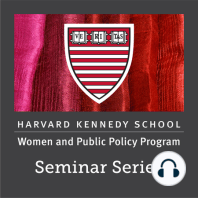80 min listen

Uncovering the Origins of the Gender Gap in Political Ambition: Early Life Experiences, Political socialization, and Candidate Emergence with Jennifer…
Uncovering the Origins of the Gender Gap in Political Ambition: Early Life Experiences, Political socialization, and Candidate Emergence with Jennifer…
ratings:
Length:
76 minutes
Released:
Aug 21, 2014
Format:
Podcast episode
Description
Research on women’s candidate emergence identifies a substantial gender gap in political ambition that is well established by the time women and men enter the professions from which political candidates ten to emerge. More specifically, women are one-third less likely than men—even when they are matched professionally, educationally, and politically—ever to have considered running for office. Yet no empirical research has examined thoroughly the origins of the gender gap in political ambition or the relationship between early socialization and interest in running for office. Based on a new national survey of 4,000 high school and college students, we identify the initial causes of the gender gap in political ambition, which is a prerequisite to closing it. Ultimately, our results speak to the gender dynamics of powerful socializing agents, and allow for an assessment of the likelihood that our political institutions will reach gender parity. Speaker: Jennifer Lawless, Associate Professor, Department of Government, American University
Released:
Aug 21, 2014
Format:
Podcast episode
Titles in the series (93)
Gender, Competitiveness and Career Choices with Muriel Niederle: Gender differences in education choices are persistent, with females being much less likely to choose STEM fields than males. What, if any, is the role of gender differences in psychological attributes that have received a lot of attention in the behavio... by Women and Public Policy Program Seminar Series